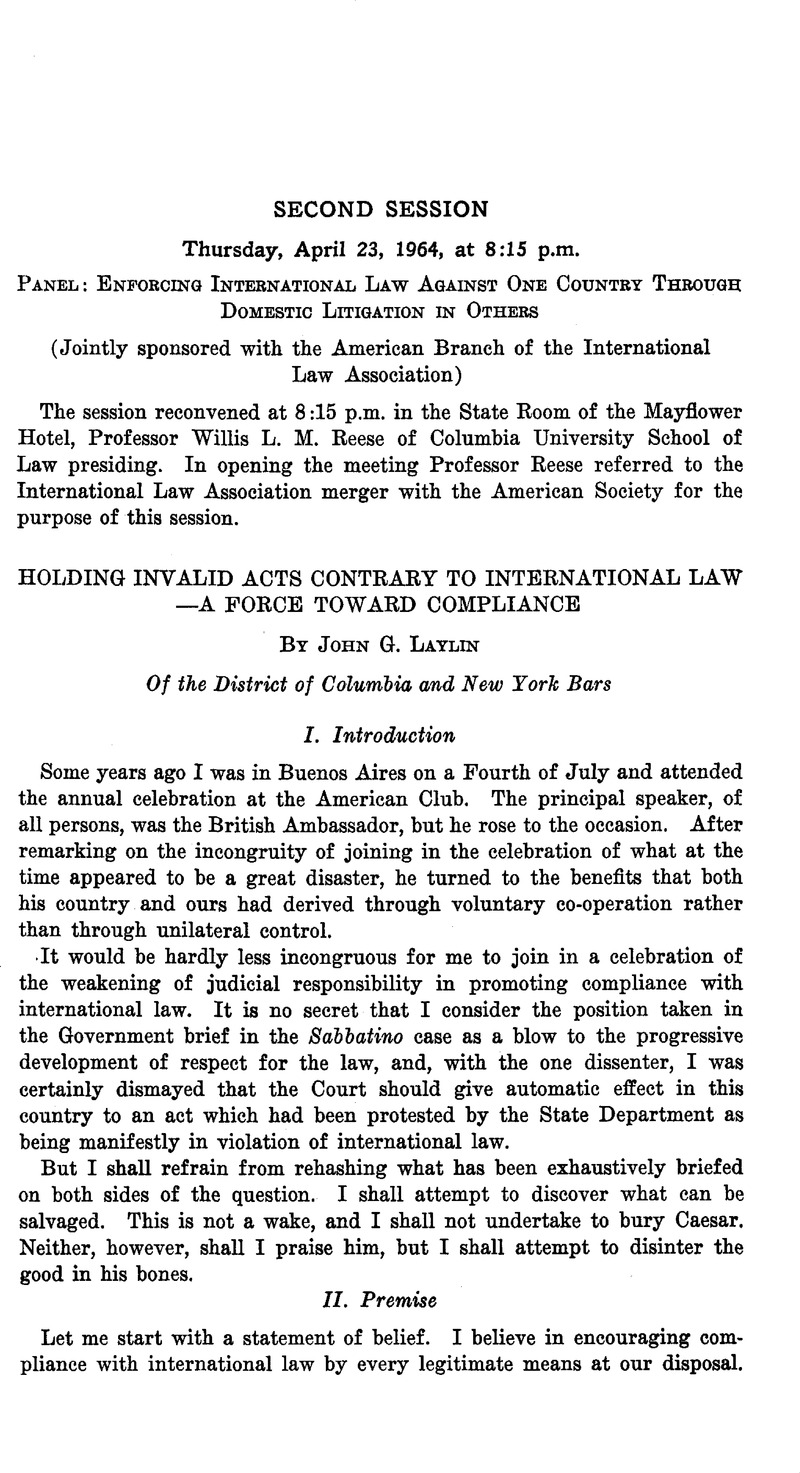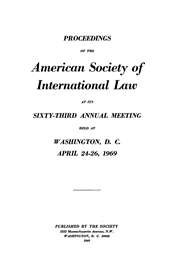No CrossRef data available.
Article contents
Holding Invalid Acts Contrary to International Law —a Force Toward Compliance
Published online by Cambridge University Press: 27 February 2017
Abstract

- Type
- Second Session
- Information
- Copyright
- Copyright © American Society of International Law 1964
References
1 36 Dept. of State Bulletin at 352 (1957); Interhandel Case, [1959] I.C.J. Pleadings, Oral Arguments, and Documents 52, 55-56.
2 Ibid, at 497, 504.
3 [1959] I.C.J. Eep. at 28.
4 “That international law does not require application of the doctrine [act of state] is evidenced by the practice of nations. Most of the countries rendering decisions on the subject fail to follow the rule rigidly. No international arbitral or judicial decision discovered suggests that international law prescribes recognition of sovereign acts of foreign governments, see 1 Oppenheim's International Law § 115aa (Lauterpacht, 8th ed. 1955), and apparently no claim has ever been raised before an international tribunal that failure to apply the act of state doctrine constitutes a breach of international obligation.” Banco National de Cuba v. Sabbatino, March 23, 1964, pp. 21-22 of majority opinion.
5 ” If Cuba did not have jurisdiction, any action which it took in regard to Farr, Whitlock or the sugar would have been ineffective to transfer C.A.V.'s claim.” (Footnote at page 13 of majority opinion.)
6 The Charming Betsy, 6 U. S. 64, 118 (1804); MacLeod v. V. S., 229 TJ. S. 416 (1913); in the latter case the Court observed at page 434: “ … it should not be assumed that Congress proposed to violate the obligations of this country to other nations, which it was the manifest purpose of the President to scrupulously observe and which were founded upon the principles of international law.“
7 ”… we decide only that the Judicial Branch will not examine the validity of a taking of property within its own territory by a foreign sovereign government, extant and recognized by this country at the time of suit, in the absence of a treaty or other unambiguous agreement regarding controlling legal principles … “ (Emphasis added.) (Majority opinion, p. 28.)
8 “Despite the broad statement in Oetjen that ‘The conduct of the foreign relations of our Government is committed by the Constitution to the Executive and Legislative … Departments,’ 246 U. S., at 302, it cannot of course be thought that ‘every case or controversy which touches foreign relations lies beyond judicial cognizance.’ Baker v. Carr, 369 U. S. 186, 211. The text of the Constitution does not require the act of state doctrine; it does not irrevocably remove from the judiciary the capacity to review the validity of foreign acts of state.” Banco National de Cuba v. Sabbatino (Majority opinion, p. 23).
9 “The act of state doctrine does, however, have ‘constitutional’ underpinnings. It arises out of the basic relationships between branches of government in a system of separation of powers. It concerns the competency of dissimilar institutions to make and implement particular kinds of decisions in the area of international relations. The doctrine as formulated in past decisions expresses the strong sense of the Judicial Branch that its engagement in the task of passing on the validity of foreign acts of state may hinder rather than further this country's pursuit of goals both for itself and for the community of nations as a whole in the international sphere.” Banco National de Cuba v. Sabbatino (Majority opinion, pp. 23-24).
10 See note 9 above.
11 See footnote 12 in dissenting opinion of Mr. Justice White.
12 “And it cannot be contended that the Constitution allocates this area to the exclusive jurisdiction of the executive, for the judicial power is expressly extended by that document to controversies between aliens and citizens or States, aliens and aliens, and foreign states and American citizens or States.
“A valid statute, treaty or executive agreement could, I assume, confine the power of federal courts to review or award relief in respect of foreign acts or otherwise displace international law as the rule of decision. I would not disregard a declaration by the Secretary of State or the President that an adjudication in the courts of the by the Secretary of State or the President that an adjudication in the courts of the validity of a foreign expropriation would impede relations between the United States and the foreign government or the settlement of the controversy through diplomatic channels. But I reject the presumption that these undesirable consequences would follow from adjudication in every case, regardless of the circumstances. Certainly the presumption is inappropriate here.” (Dissenting opinion, p. 23.)




